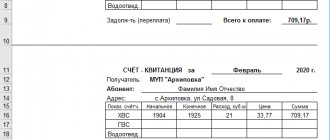No one lives in the apartment, the meters have expired, and a large fine has been imposed
Question: I installed water meters in my apartment, but I haven’t lived there for a long time. Now it turns out that I have to pay a fine for not checking these meters. But when installing the meters, no one told me about verification. Is this legal? Is it possible to do some recalculation? After all, I don’t consume water, and the meter is actually idle!
A common situation is that the apartment is empty, no one lives in it. There are water meters, but their verification period has expired. The result is that the owners received a large bill for water. The owner perceives this as a fine. In fact, this is not the case - it’s just that now the payment for water has begun to be calculated according to standards, and this turns out to be much more expensive. And what to do with it? How to reduce utility costs? We are publishing explanations on this topic from the St. Petersburg State Unitary Enterprise VTsKP (city settlement center for utility payments).
We recommend reading: Benefits for connecting to mobile communications for labor veterans
Gcal, coolant, hot and network water
— Let the manager explain what we are paying for and how the concepts listed above differ from each other. It is difficult for us, ordinary residents, to maneuver in technical terms.
Question from the site nashdomkch.ru
Sergey Kirilyuk, head of the energy department of the UZHK “Our Home”, answers:
Invoices for heat and hot water presented by heat supply companies may indicate the following tariffs: - per Gcal, (RUB/Gcal); — for network water (rub/t) or for coolant (rub/m3); — for hot water or domestic hot water (RUB/m3)
Not all consumers understand why their bills include a large amount for heat energy (RUB/Gcal), for hot water (RUB/m3), and then a relatively small amount for network water (RUB/m3). T). What is this additional fee? I will not give a dictionary definition of thermal energy, I will try to explain it “on my fingers”.
Think about how hot water differs from cold water, what affects the temperature of the water? It differs in the amount of heat it contains. This heat (or, in other words, thermal energy) cannot be seen or touched, it can only be felt. Any water with a temperature above 0°C contains some amount of heat. The higher the temperature of the water (steam or condensate), the more heat it contains.
Heat is measured in calories, in joules, in MW/h (megawatt per hour), not in degrees °C. Since tariffs are approved in rubles per gigacalorie, we will take Gcal as the unit of measurement. Thus, hot water consists of the water itself and the heat energy or heat contained in it (Gcal). The water seems to be saturated with gigacalories. The more Gcal there are in the water, the hotter it is.
In heating systems, the coolant (hot water) comes in at one temperature and leaves at another. The water releases some of its heat into the environment through heating radiators. For this part, which has not returned to the system, and which is measured in Gcal, someone needs to pay.
With hot water supply, we consume all the water and, accordingly, all 100% of the Gcal in it, and do not return anything back to the system.
What is coolant? All the hot water that runs through the pipes into the heating system or into the hot water supply system, as well as steam and condensate (the same hot water). The word coolant consists of two words - heat and carries. When making calculations, heat supply companies break down the coolant into Gcal and network water, which confuses some consumers.
If previously UZHK “Our House” charged for hot water according to DHW tariffs in rubles/m3, now we break down the coolant for DHW needs. In our invoices for hot water there is no tariff of rubles/m3. We bill for DHW in the same way as for heat, separately for network water and separately for Gcal.
The tariff for network water takes into account only the water itself, and does not take into account the Gcal in it. The hot water tariff takes into account both water and Gcal in it.
Depending on the purpose (for heating or for hot water supply), the coolant is subject to different temperature and sanitary standards. For hot water supply, there is a minimum permissible temperature that must be provided by the heat supply organization, as well as increased quality requirements.
In Kachkanar there is a 2-pipe open heat supply system, from which the hot water supply system in each separate house is powered - this was determined by the project during the construction of the city. In the summer, there is no circulation of the heating system; hot water is supplied through one of the pipes of the heating system (starting from the thermal power plant and to each consumer).
The temperature of the heating fluid depends on the outside air temperature (weather). The colder it is outside, the more we warm it up.
Conclusions: - when paying for heat, you will need to pay for Gcal. When paying for hot water - both for Gcal and for network water (coolant); - coolant - carries heat, hot water, also known as network water + Gcal in it; — network water — water without Gcal; — in life, coolant and network water can mean the same thing.
Large water bill, what to do
Periodic high electricity bills have become a common occurrence for Antalya residents, especially during the winter months. Every year in January-February, suppliers, through clever manipulations, issue bills to consumers that greatly exceed the usual norms. Numerous lawsuits, scandalous reports, and complaints against energy companies have not yet brought any noticeable results.
What to do if you receive a very large water bill in Antalya? Where can I go, what measures to take, how to identify a leak? Is it possible for unscrupulous neighbors to connect to the left, how can this be determined?
Where to complain about incorrect housing and communal services charges
Gas payments are calculated based on meter readings. If they are absent, then the standard indicators for each person living in the premises are taken as a basis. If there are long interruptions in gas supplies, then the consumer has the right to apply for a reduction in the amount of payment, as well as demand payment of a fine.
Before preparing a claim, you need to familiarize yourself with the tariffs in force in your region at the time of calculation and carefully analyze the readings of water, gas, electricity and heat meters on the date of payment.
Why do residents overpay for water heating?
“Having studied water meters for several years, I found out that the sum of the readings of individual water meters does not coincide with the readings of a group meter for the entire house. Moreover, in some cases the difference is 140-200 cubic meters. And what happens in the end? For heating water, residents of the house have to pay 2 times more than the standard. When I addressed this problem to the housing and communal services and the district administration, they put the house under control, changed the heat meter, and then they answered: everything is correct. How can it be true that we are paying twice as much for hot water? Yuri Klimenko, Gomel.”
Alexander Sivakov, first deputy chairman of the Gomel City Executive Committee:
- Based on the first part of paragraph 37 of the Regulations on the procedure for payment and payment of fees for housing and communal services and fees for the use of residential premises of the state housing stock, approved by Resolution of the Council of Ministers of June 12, 2014 No. 571 ( hereinafter referred to as the Regulations), payment for hot water supply services is carried out by payers of housing and communal services based on the cost of heating water, calculated based on the tariff for 1 gigacalorie of thermal energy for heating and hot water supply, and the amount of thermal energy spent on heating water with subsequent distribution in proportion to the volumes of consumption, determined by the readings of a group metering device for the consumption of thermal energy for heating water, with subsequent distribution in proportion to the volumes of hot water consumption for each payer of housing and communal services.
In turn, based on the second part of paragraph 37 of the Regulations, the volumes of hot water consumption are determined based on the readings of individual metering devices installed in residential or non-residential premises, and in their absence - based on the hot water consumption standards established by local executive and administrative bodies.
Thus, according to the current legislation, the calculation of payment for thermal energy to each consumer in a residential building consumed for heating water is carried out in the following order:
1. the total amount of thermal energy consumed to heat water in a residential building is determined by the readings of a group metering device for heating water (group heat meter);
2. the total volume of hot water consumption is determined as the sum of readings from individual hot water metering devices (individual water meters) installed at consumers;
3. the total amount of thermal energy according to point 1 is divided by the total volume of hot water consumption according to point 2. The result obtained is the specific heat consumption for heating 1 cubic meter of water in a given residential building;
4. specific heat consumption for heating 1 cubic meter of water according to point 3 is multiplied by the volume of hot water consumed by each payer according to the readings of his individual hot water water meters;
5. The amount of thermal energy according to point 4 is multiplied by the thermal energy tariff.
In this order, you propose to change point 2 and determine the total volume of hot water consumption according to the readings of the group heat meter. It should be clarified that this device is capable of measuring and displaying information about the following volumes of hot water:
1. the volume supplied to the internal hot water supply network for consumption;
2. the volume returning back (unconsumed) from the in-house hot water supply network.
How will the accrual of penalties for late utility payments change in 2019?
As is known, in addition to penalties, resource supply organizations have the right to limit or completely stop the supply of electricity, heat, water and gas. Of course, before cutting off a consumer from an energy resource, there will be several warnings.
Usually the first action is to turn off the lights in an apartment, private house or entire building. There are often cases when, after an electrician’s visit and cutting the wires, residents are connected without permission. Such actions are a violation not only of current legislation, but also of safety regulations. Therefore, amendments to the law significantly increased penalties for such arbitrariness.
What to do if the seal on the water meter is broken
If you do not notify the water supplier about the seal being broken, and this fact is revealed during the inspection, then the calculation will be made for cases of interference with the operation of the metering unit - based on ten times the volume.
If a seal accidentally breaks, you should not put the problem on hold and immediately contact the appropriate water meter service organization. This could be a management company, HOA, water utility or other service company.
We recommend reading: Benefits for Low-Income Families in 2020 Amendments in the Krasnodar Territory
A spoon is on its way to dinner: deadlines for paying for housing and communal services or by what date you need to pay
Please remember that when using different payment methods, payment may be delayed in transit. Although the amount for housing and communal services was paid on time, since the date of enrollment may differ by several days, you will have to pay penalties for the number of days the funds are detained in transit. The ideal period for paying for housing and communal services is not considered to be when deadlines are running out, but when payment is made in advance.
Payment for electricity can be made through your Mosenergosbyt personal account. It calculates the amount and provides the choice of making payment online by credit card, from a mobile phone or through the QIWI payment system. There is a warning on the website about an increase in the amount of penalties from January 1, 2020.
We recommend reading: How to Adopt a Child in the Krasnodar Territory from an Orphanage
Law on penalties for utilities
The law also provides for increased administrative liability if the homeowner unauthorizedly connects to electrical and heating networks, gas pipelines or water supplies. Thus the amount of the fine is:
The generally accepted rule is that utility bills must be paid every month no later than the tenth day. If services are provided under an agreement, then it usually indicates by what date it is recommended to make payments. In case of untimely or incomplete payment for services provided, the Russian legislative framework provides for the accrual of a penalty, the so-called penalty. These provisions are clearly stated in the Housing Code.
Data transfer deadlines
The rights and obligations of utility organizations and consumers are approved by Government Decree No. 354, adopted in May 2011 and establishing the basic rules for the provision of these services to the population.
Document for downloading and reading the resolution: Decree of the Government of the Russian Federation No. 354
According to the specified document, the transfer of information for the current month must be carried out no later than the 26th day, and not after the end of the reporting period.
We recommend: Automatic switches for electricity meters
Checking the accrual of utility bills in 2020
Dear readers! The article talks about typical ways to resolve legal issues, but each case is individual. If you want to find out how to solve your particular problem , contact a consultant:
- Due to frequent changes in legislation, information sometimes becomes outdated faster than we can update it on the website.
- All cases are very individual and depend on many factors. Basic information does not guarantee a solution to your specific problems.
Where to complain about incorrect rent calculations
In addition, in most regions there is a hotline for housing and communal services charges. You can call about housing and communal services receipts not only if an error is identified, but also to obtain information about tariffs and current benefits.
- establish the amount of current tariffs on the date of accrual of payments;
- clarify the correctness of the submitted meter readings in order to eliminate possible errors in calculations;
- call or contact officials of the management company or settlement center to eliminate the error;
- if a recalculation refusal is received, submit an official application or complaint to the authorized bodies.
Heating bills
4.1. If the heating valve is the first shut-off device from the riser, that is, common property, then the management company. If she doesn’t do this, you can safely file a complaint with the housing inspector or the court. If not the first device, then the owner of the premises.
3.1. Hello. In any case. If you do not pay utility bills within two months, the management company has the right to suspend the provision of such services, charge penalties and apply to the court for a court order.
What happens if the data is not transferred in a timely manner?
According to paragraphs. 58 – 60 of the above government resolution No. 354, if the testimony is not reported within the prescribed period, charges for the provision of services are made in the following order:
- For three months, the amount is determined based on the average previous expense over the last six months. After receiving the data, the value is recalculated;
- Starting from the fourth month, the consumer will receive an invoice with the amount determined according to the standards applicable to payers without individual metering devices.
We recommend: How to register an electricity meter
Considering that the amount according to the standards significantly exceeds that calculated by the water meter, the consumer should not forget about the need to timely transmit meter readings, otherwise he will have to pay much more than usual.
What to do if you receive a large bill due to failure to provide evidence
If for some reason the consumer has not reported water meter data for more than three months and has received a huge water bill, the following options are possible:
- Pay the bill, then contact the water supply company, providing the necessary data with an application for recalculation and confirming your identity with a civil passport. After clarification of the readings, the amount is recalculated. The overpayment goes towards future deductions;
- Contact the city water utility without paying the bill received. If the review of the application is positive, the amount will be recalculated.
The current rules suggest that the payer must transmit data based on water meter readings at least once every three months in order not to pay more than the actual volume consumed.
Incorrect housing and communal services charges
Apartment owners are required to pay utility bills in full within the period established by current legislation. The management company or other similar organization, in turn, must provide full quality services and make correct rent calculations.
Important! Claims from users arise if utility bills exceed the cost of tariffs or the figure is higher than what it was last month. If an incorrect calculation has been made for housing and communal services, you need to contact the appropriate organization.
Kravchenko Life
Please note that if the water meter verification date is missing or late, you must provide meter verification reports to your management organization. When you first access the electronic service, you need to submit initial readings from water meters at the Public Services Center in your area. It is recommended to transmit hot and cold water consumption readings from the 15th of the current month to the 3rd of the next month, otherwise they will be taken into account in the next billing period.
We recommend reading: Order of the Minister of Defense of the Russian Federation on the transfer of conscript soldiers to the reserve, spring summer 2019
Let's perform calculations using the example of the Crimean tariff for water supply and sewerage, which then must be paid. The calculation of water supply and sewerage services is carried out jointly, so the tariff will seem high, regardless of the liters consumed. After completing all the required calculations in the cube, we take the water payment book and go to the nearest bank where utility bills are accepted in order to pay for the services.
What to do with a large utility debt
The Russian housing code states that if there is a debt for an apartment that exceeds a total period of six months, the debtor and his entire family can be evicted. In order to get rid of debts and prevent the worst consequences, you need to make an action plan and follow it. The most important thing is to find out the amount you owe for rent. You will need:
- Contact the housing office at your place of registration or the management company. You will be informed of the amount and penalties assessed, if any. But you should be prepared for the fact that in order to obtain the necessary information, the likelihood of standing in a long line is high, which means that a lot of time will be spent.
- Go to the website of your management company, register (for this you will need a phone number), log into your personal account, enter your personal account number.
- Use the services of a bank that provides services for paying for housing and communal services: register, log into your personal account. This way you can not only find out the amount of debt, but also pay it immediately if necessary.
We recommend reading: 50 pensions are written off from the debtor; can bailiffs describe the property?
How to receive receipts by email
To download a receipt from an email, simply open the email with the attached file and click the “Download” button. As a rule, receipts are saved in .pdf format and contain the following information: payer’s personal account number; billing period; Full name of the payer; address; number of registered people; total living area; information about the company providing services (name, contact details, bank details); name of utilities to be paid (cost, units of measurement, presence of debt); volume of service for the billing period; meter data (current and previous readings, tariff, amount payable, debt, total); recalculation of services; information on the availability of subsidies and benefits; agreement on deferred or installment payment.
We recommend reading: Who Appoints a Manager in the Homeowners Association
By virtue of paragraph 10 of Art. 161 of the Housing Code of the Russian Federation, the management organization is obliged to provide free access to information: about the work performed and services provided for the maintenance and repair of the common property of an apartment building; on the procedure and conditions for their implementation and provision; about their cost, tariffs (prices) for resources necessary for the provision of housing and communal services, in accordance with the information disclosure standard approved by the Government of the Russian Federation.
What may be the consequences of non-payment for major repairs - court
The vast majority of collections of unpaid payments for major repairs through the court took place in a simplified manner. This means that the court for payment of capital repairs issues not a decision, but a court order that must be executed.
From the point of view of a specialist who objectively examines the current legislation, the situation is not so clear-cut. The first disagreement between the laws is that the process of paying for capital repairs itself contradicts the Constitution of the Russian Federation.
How to recalculate water bills using meters: application, procedure according to Resolution 354
The most common situation that requires recalculation of accrued amounts for cold water or hot water supply is incorrectly transmitted readings to the resource supply organization, which resulted in an overpayment for water.
If the management company refuses to carry out an inspection, the residents have the right to draw up a joint act, which will subsequently become the basis for imposing a fine on the management company. If the fact of the temperature of the hot water supply is confirmed, it is attached to the application for recalculation, which is submitted to the heat supply organization (if an agreement is concluded with it), or to the management company (if, under an agreement with the consumer, payment is made through it). In this case, the period during which the service was non-conforming is indicated (such a period is determined according to paragraph 112 of Resolution 354).
New in blogs
Dear residents!
When calculating the payment for thermal energy for preparing hot water, both the Administration of the city of Perm (UZHKH) and heat supply organizations (LLC "PSK"), the following formula is used:
Cr = Pr x k x Ne rub. , Where:
Сг – price for heating 1 cubic meter. m of water;
Рг – readings of an individual (apartment) DHW meter or standard for the billing period (cubic m);
k – coefficient of thermal energy consumption for heating 1 cubic meter. m of water (Gcal/cubic m);
Ne – tariff for thermal energy (RUB/Gcal).
Coefficient k is determined by calculation based on the following:
In accordance with the Decision of the Perm City Duma dated December 23, 2003. No. 161 “On standards for the consumption of utility services,” the standard for consumption of utility services in the form of water heating is 0.213 Gcal/person. per month.
standard for hot water consumption ( cubic m/person ) in the city of Perm. In this case, in accordance with sub. a) clause 20 of the Rules for the provision of public services to citizens, approved by Decree of the Government of the Russian Federation of May 23, 2006 No. 307, building codes and regulations (SNiP) apply.
According to Appendix No. 3 SNiP 2.04.01.-85 (2000), approved by the Decree of the USSR State Construction Committee dated 10/04/1985. No. 189, the average daily hot water consumption rate is 105 liters/person.
Based on this, we obtain the standard (volume) for hot water consumption per month - 3.194 cubic meters. m/person per month (105 liters multiplied by 365 days and divided by 12 months).
To determine the coefficient k of thermal energy consumption for heating 1 cubic meter. m of water (Gcal/cub.m) the required amount of Gcal/person. ( 0.213 ) divided by the volume of hot water consumption per month ( 3.194 ) (0.213:3.194= 0.066687… ).
That is, the numerical expression of the coefficient k is 0.0666875319.
Giving explanations regarding the numerical expression of the coefficient k , the administration of the city of Perm (UZHKH) simply ignores the rules of mathematics, which are known to any student in the 6th grade of the school, and rounds the decimal fraction to 0.06 .
Heat supply organizations round to the nearest 0.067 . Accordingly, management organizations and homeowners associations (residential complexes, housing cooperatives) do the same.
This position is supported by the Office of the Federal Service for Supervision of the Protection of Human Rights and Welfare in the Perm Territory (Rospotrebnadzor) (following a complaint from residents regarding overinflated fees for hot water supply due to the use of an incorrect coefficient (0.06) when calculating the cost of thermal energy required for heating 1 cubic meter of water, in relation to LLC Management Company "Dorstroytrans" (Resolution dated July 15, 2010) and LLC "Housing Management Company" (Resolution No. 516-04 dated August 30, 2011, court decision dated November 3, 2011) an inspection was carried out At the end of the inspection, the proceedings in the case of an administrative offense under Part 2 of Article 14.6 and Article 14.7 of the Code of Administrative Offenses of the Russian Federation in relation to LLC Management Company "Dorstroytrans" and LLC "Housing Management Company" were terminated due to the absence of violations of the law in its actions
From 01/01/2011 the tariff (cost) for 1 Gcal was determined to be 1144.67 rubles. (Resolution of the Regional Energy Commission of the Perm Territory dated December 21, 2010 No. 300-t). Accordingly the price , and not the tariff, for heating 1 cubic meter. m of water for the population is 76.34 rubles.
LLC "Housing Management Company"






